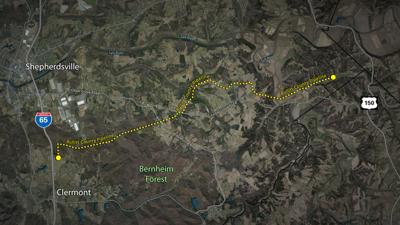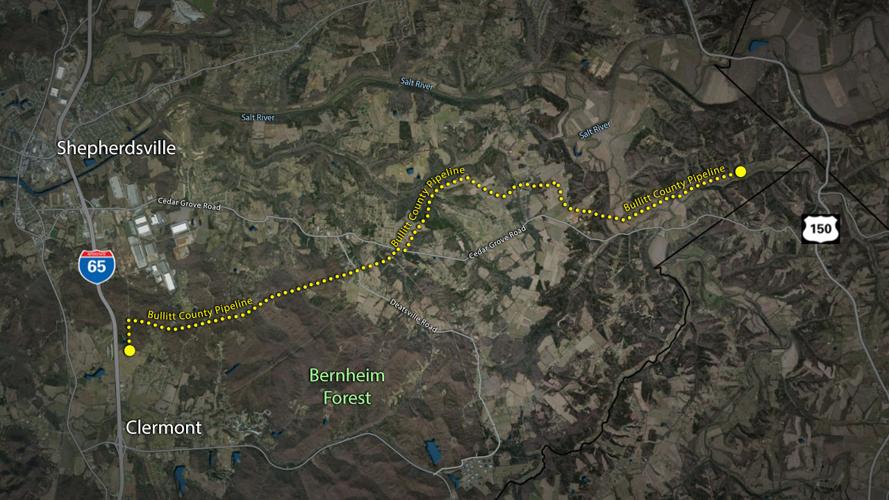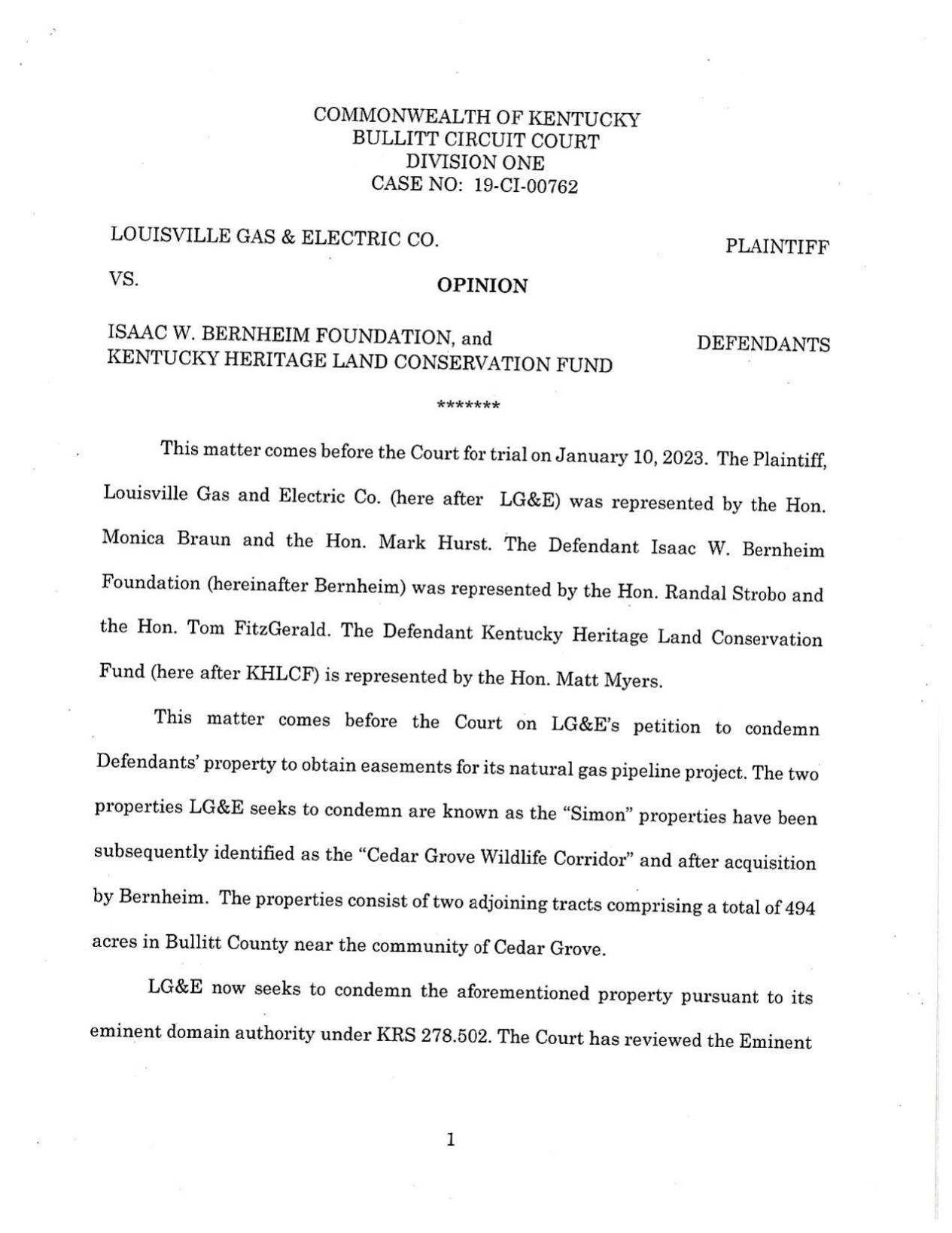LOUISVILLE, Ky. (WDRB) -- A judge sided with Louisville Gas & Electric in a lawsuit challenging whether the utility can condemn land owned by Bernheim Arboretum and Research Forest for a proposed natural gas pipeline.
Bullitt Circuit Judge Rodney Burress ruled Friday that LG&E has the right to the easements under Kentucky's eminent domain law, turning back a number of arguments from Bernheim on why the land should be exempt.
LG&E is "pleased with outcome of the proceeding" and looks forward to continuing the pipeline plan, spokeswoman Natasha Collins said in a statement. "This project will enhance reliability for current customers in the area and expand capacity to support the energy needs of this quickly growing region."
Bernheim hasn't decided its next steps, including a possible appeal to the Kentucky Court of Appeals, the organization said in a statement that read in part: "Other factors at play could delay or even stop this proposed pipeline, including a hope that Kentucky’s decision makers and officials realize that the climate crisis is real, as evidenced in the recent severe weather events including tornados, floods, and winds, and move quickly towards a more sustainable and renewable energy future."
The Bernheim case is just one of several pipeline-related lawsuits moving through the court system in Kentucky. Other landowners have similar condemnation rulings awaiting action by the state appeals court.
But it is undoubtedly the most high-profile effort by LG&E to gather land for the pipeline, spurring campaigns against the route and prompting a Louisville Metro Council committee last month to pass a nonbinding resolution opposing the condemnation plan for the Bernheim section.
Councilwoman Betsy Ruhe, D-21, said she sponsored the resolution because she believes the pipeline will cause damage to the environment.
"Because we all have a stake in this. It's our planet. It's everybody's," Ruhe said. "And if there's anything that I can do to slow, to eventually reverse, climate change, I'm going to persist in doing it."
Ruhe said she was disappointed in the ruling, and hopes the full Metro Council will support the resolution as a strong message committing to protecting the environment.
"I hope to leverage the power of the people and to put some pressure on LG&E because we're the rate payers," she said. "And we're going to be the ones paying for this pipeline, which if it ever gets forced down their throats that they have to stop using fossil fuels, is going to be what's called a stranded asset. And as the rate payers, we're gonna have to pay for it."
Louisville-based LG&E sued Bernheim in 2019 after it was unable to reach a deal to buy an easement for the proposed 12-mile line, which would run through central Bullitt County south of the largest cities of Mount Washington and Shepherdsville. The lawsuit was one of at least 10 condemnation suits involving landowners who refused to sell property for the project.
The pipeline would cross through Bernheim's Cedar Grove Wildlife Corridor and not the popular, publicly accessible recreation area off KY 245. But routing the line through the corridor could destroy habitat for bats and other endangered and rare species and damage nearby streams springs, forest officials argue.
LG&E claims the roughly 4.5-acre easement amounts to less than 0.028% of Bernheim's total 16,000-acre holdings and isn't in a public area. The pipeline would run alongside an electric transmission line owned by the East Kentucky Power Cooperative.
Lawyers for LG&E, Bernheim and other parties made their case during a two-day trial in Shepherdsville that concluded on January 11.
Among the key issues in the lawsuit is whether Kentucky's eminent domain law allows utilities to take publicly-owned land. It's undisputed that private land can be condemned for projects deemed to be a public benefit, such as a gas pipeline or road.
Bernheim says it bought the 494 acres in the Cedar Grove corridor with aid from a $706,500 grant from the Kentucky Heritage Land Conservation Fund board, a public agency whose members include governor's appointees and high-ranking state officials.
In an memorandum filed in court in late January, Bernheim lawyers argued that "Bernheim has established that: the subject property must be protected in perpetuity under Kentucky law, the Eminent Domain Act of Kentucky does not grant LG&E the right to take a publicly-held property interest."
They claimed that condemning the Bernheim-owned land for the pipeline is "fundamentally inconsistent with the perpetual conservation" of the state-funded property, which deed restrictions and conservation easements.
"When, as here, a new public use will destroy the previous use to which the property was devoted, that power must be conferred in express terms and strictly followed," the attorneys argued.
In its post-trial memo, LG&E lawyers claim the utility has a "clear statutory right" under Kentucky law to condemn the property and contend that Bernheim and the state conservation fund board were trying to re-litigate whether the the Cedar Grove land can be taken because it is a conservation easement.
That issue is settled, according to LG&E, because the Kentucky Court of Appeals previously found in a 2022 case that state law lets "eminent domain to prevail over a conservation easement because a conservation easement is assumed not to exist upon the exercise of a statutory right of eminent domain."
LG&E has secured 69 of 78 easements necessary for the pipeline, according to spokeswoman Collins. Besides the Bernheim easement, the remaining ones are awaiting action from the appeals court.
The project, initially expected to cost $39 million, has nearly doubled in price to $75 million, according to estimates.
Earlier this year the Kentucky Supreme Court declined to hear Bernheim's appeal by in a 2020 lawsuit over state regulators' 2016 approval of the pipeline.
Bernheim had challenged the Kentucky Public Service Commission's dismissal of its complaint, which claimed LG&E failed to follow state law and regulations because it did not apply for a “certificate of public convenience and necessity” for the proposed pipeline.
WDRB News reported in 2019 that Kentucky doesn't require the same notification for pipelines and it does for other large infrastructure, such as cell towers and electrical lines.
LG&E included the pipeline in an application to raise its customers' rates. The line's first mention came on page 209 of a detailed 1,776-page filing with the Public Service Commission in November 2016.
Regulators later approved the certificate during the rate case.
This story may be updated.
Copyright 2023 WDRB Media. All Rights Reserved.















